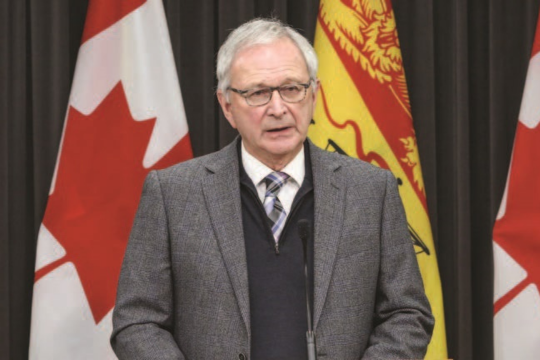
New Brunswick Premier Blaine Higgs has moved thousands of New Brunswickers’ pensions from defined benefit to shared risk models. Photo: GNB
Two CUPE locals in New Brunswick have filed a legal challenge after Premier Blaine Higgs introduced new legislation that would transform their defined benefit pensions into “shared-risk” (or target benefit) pensions.
The legal challenge came in February 2024. In November 2023, after negotiations broke down, the Higgs government pushed through shared-risk pension plan legislation — Bill 17 — or the Pension Plan Sustainability and Transfer Act. The legislation transfers public service pensions from a defined benefit plan to a “shared-risk” model, requiring employees to make up for shortfalls, effectively moving pension risk from the government to the employees. And, it could mean higher contribution rates and lower benefits depending on market performance.
The legislation covers five employee groups — 7,200 school custodians, maintenance workers, bus drivers and educational support staff as well as nursing home employees in the province.
On Dec. 12, the majority Progressive Conservative government MLAs voted in favour while all other parties voted against. It received royal assent only a day later. The government was heavily criticized for how quickly it pushed through the legislation. Higgs blamed the lack of debate on the opposition, despite the government having passed a motion to cap debate.
The Higgs government and the unions had signed a memorandum of agreement to come together to work on a pension plan that was feasible for both sides and the two sides agreed to mediation if an impasse was reached. In September, the unions gave notice of an impasse, but instead of mediation, the government moved forward with Bill 17.
Higgs accused the unions of dragging their feet on the negotiation process, though reporters pointed out that the government was responsible for the deadline extensions. At the time, Theresa McAllister, provincial president of CUPE Local 2745 said: “It’s a pension issue, but moreso, it’s a breaking of a free, collective agreement. That’s the big issue … This is going to have a big impact on all groups. Of course we have to push back. We have to fight back.”
On Jan. 20, 2024, the unions filed a legal action asking for the Court of King’s Bench to declare the law unconstitutional as it “substantially interfered” with the right to free bargaining.
This isn’t the first time Higgs has been involved in pension reform of this kind. In 2013, when he was finance minister, he tabled a pension reform bill (Bill 11 – An Act Respecting Pensions) that moved 30,000 public servants to the shared-risk model from a defined benefit plan. At the time, labour unions in New Brunswick pushed back against the changes, challenging them in court on the basis of violation of the Charter right to free association.
In 2022, the court ruled that the province had the power to change pension legislation, and that they were able to include an exemption from legal challenges, which was included again in the recent Bill 17.
This example should give Federal Retirees a stark reminder that governments, as the legislator, employer and pension plan sponsor, hold significant power to make legislative change unilaterally. That’s why it is important to actively advocate for retirement income security by building relationships with politicians and reminding them that while they may be able to make those changes, it would be a mistake to do so.

